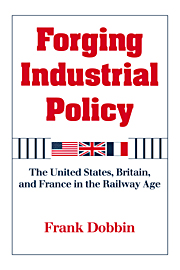1 - Political culture and industrial rationality
Published online by Cambridge University Press: 05 June 2012
Summary
Introduction
During the nineteenth century, each Western nation-state developed a distinct strategy for governing industry. Prevailing theories of policymaking neglect the origins of those strategies, and ultimately fail to explain why they persist through revolutions, regime changes, wars, and depressions. Functional and economic theorists who suggest that policy is driven by laws of economic efficiency cannot account for the fact that different nations show no clear pattern of convergence toward a most-efficient model. Political theorists who suggest that policies reflect the preferences of those who hold power cannot account for the fact that national industrial strategies endure under regimes with dramatically different ideologies.
Analysts use words such as “tradition” and “legacy” to explain national policy strategies, yet most theoretical frameworks privilege generalizable political and economic variables and make no place for national customs. The result is an unfortunate disjuncture between theory and empirical findings in comparative studies of policy: Whereas theory highlights universal political and economic forces, in the last analysis empirical investigations usually point to the effects of tradition. Thus in many studies, after theoretically important factors are used to explain a tiny proportion of the cross-national variance, culture and tradition are thrown in to explain the huge remaining “residual” variance. The reluctance to theorize and investigate traditions stems, I contend, from a core tenet of the modern worldview – namely that idiosyncratic traditions are relics of an earlier age that will eventually be washed away by the forces of logic and reason.
- Type
- Chapter
- Information
- Forging Industrial PolicyThe United States, Britain, and France in the Railway Age, pp. 1 - 27Publisher: Cambridge University PressPrint publication year: 1994

